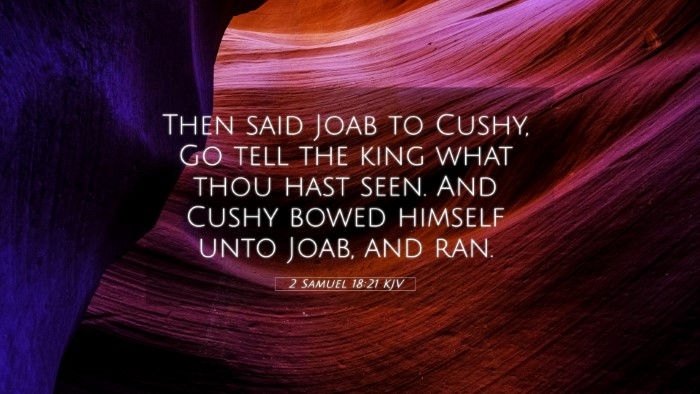Understanding 2 Samuel 18:21
2 Samuel 18:21 states: "Then Joab said to Cushite, 'Go tell the king what you have seen.' So Cushite bowed himself to Joab and ran."
This verse captures a critical moment in the aftermath of the battle between David's forces and those loyal to Absalom. Joab, David's military commander, instructs a messenger named Cushite to deliver the news of the battle's outcome to King David.
Verse Meaning and Insights
To fully understand 2 Samuel 18:21, it is essential to draw insights from public domain commentaries by Matthew Henry, Albert Barnes, and Adam Clarke.
-
Matthew Henry's Commentary:
Henry emphasizes the gravity of the message being delivered and the urgency behind Joab's command. He notes the importance of obedience in the role of the messenger and how the news would significantly impact King David.
-
Albert Barnes' Notes:
Barnes elaborates on the messenger's task, indicating that it required not only speed but also sensitivity to the emotional state of David after a devastating battle. The verse reflects how communications were handled in ancient times, highlighting the significance of the messenger's role in relaying critical information.
-
Adam Clarke's Commentary:
Clarke provides historical context regarding Absalom's rebellion and its implications for David's reign. He discusses the symbolic values of the messenger's actions and the broader consequences of warfare in the narrative. Clarke notes that this verse precedes a significant turning point in the kingdom's dynamics.
Thematic Connections
The act of sending a messenger conveys themes of communication and the transfer of vital information, which resonate throughout the Bible. This moment can be linked to several other scriptures to provide deeper insights into its meaning.
Related Bible Cross References
- 1 Samuel 4:17: The message of defeat is delivered, echoing the role of the messenger in battle news.
- 2 Samuel 18:19: Ahimaaz also desires to deliver news, showcasing the competitive nature of news delivery.
- 2 Samuel 18:31: The arrival and news of victory by the Cushite intensifies the emotional stakes for King David.
- Jeremiah 51:31: Here, a messenger is also tasked with delivering important news, illustrating the role across the scriptures.
- Isaiah 52:7: The beauty of those who bring good news illustrates the intrinsic value placed on the message and its bearer.
- Matthew 28:7: The angel's command to inform the disciples about the resurrection reflects similar themes of important messengers throughout the Bible.
- Romans 10:15: The concept of messengers bringing good news is echoed in the New Testament context, relating to evangelism.
- Luke 10:1: Jesus sends messengers ahead of Him, reflecting the importance of prepared communication in ministry.
- John 1:6: John the Baptist is described as a sent one, emphasizing the ongoing Biblical motif of messengers bringing pivotal news.
- Revelation 10:7: The announcement of God’s purposes by a messenger signifies the continuous role that messengers play in God’s revelation to humanity.
Understanding the Concept of Message Transmission in the Bible
The role of the messenger in the Bible is significant; it transitions not only information but also the weight of expectation and emotional consequence. Each messenger's news alters the course of events for those who receive it and is a recurring theme in biblical narrative.
The way Joab commands Cushite to convey news to David portrays leadership dynamics and the conversation between authority structures in the Bible. Insights from 2 Samuel 18:21 reveal deeper interconnections and themes involving obedience, loyalty, and the reactions to significant life events. Understanding these layers can enrich one's Biblical study using cross-referencing tools.
Tools for Bible Cross-Referencing
When studying verses like 2 Samuel 18:21, employing tools for Bible cross-referencing can enhance understanding:
- Utilizing a Bible concordance can help identify verses related to your study.
- A cross-reference Bible study system allows you to see thematic connections across different books.
- Investing in comprehensive Bible cross-reference materials aids in a deeper comparative analysis of Scripture.
Conclusion
2 Samuel 18:21 is a pivotal verse that encapsulates the crucial role of the messenger in biblical narratives. Drawing connections with related verses emphasizes the importance of communication and how such acts can change the course of lives and history. By employing cross-referencing tools and engaging with both Old and New Testament themes, readers can appreciate the interconnectedness of the Scriptures far more deeply.


